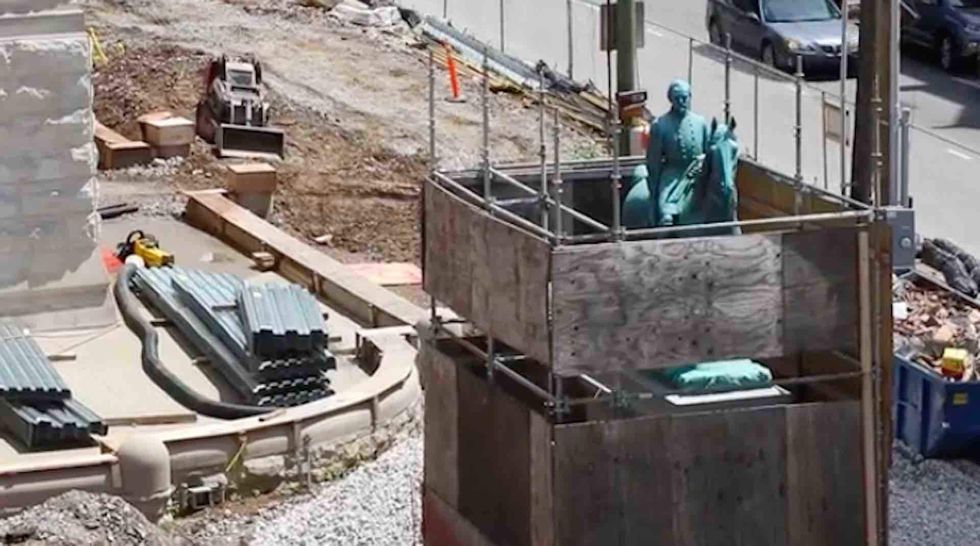The recent domestic terrorist attack by a white supremacist in Charlottesville, Virginia, came after the city announced the removal of a Confederate general statue. Now, other southern cities are grappling with whether to leave Confederate statues in place and, if not, what to do with them.
Lexington, Kentucky, is among these cities. Lexington features two prominent Confederate statues: one is of confederate Gen. John Hunt Morgan and another of former U.S. Vice President, congressman and Confederate Secretary of War John Breckinridge. Both stand near the former Fayette County Courthouse on Main Street.
According to the Lexington Herald-Leader, the statue of Gen. John Hunt Morgan was dedicated in 1911. The Breckinridge statue dates back to 1887.
Now, after more than a century since the statues were erected, Lexington Mayor Jim Gray says it's time to remove them from the public square.
“We have thoroughly examined this issue, and heard from many of our citizens," Gray tweeted.
The mayor said that even before the attack in Charlottesville, Virginia, he had planned ask the Lexington-Fayette County Urban County Council to move the two statues to nearby Veterans Park. The events that unfolded in Charlottesville, which resulted from protests over the removal of a statute of Confederate Gen. Robert E. Lee, simply "accelerated" the announcement, Gray said.
Gray said he will now ask the board on Tuesday to move the two statues.
The mayor noted that the courthouse, where the statues currently reside, is being turned into a visitor center.
It's not the first time that city officials have attempted to move the Confederate statues, though.
According to the Herald-Leader, the Urban County Arts Review Board advocated back in November 2015 for the statues to be removed. The decision came just five months after the Hunt Morgan statue was defaced with "Black Lives Matter" written in black paint, the Herald-Leader reported.
However, it wasn't clear at the time whether the relocation of the statues would result in a loss of state and federal historic tax credits. A military commission also required the city to propose another home for the statues, which city officials had not yet decided on.
Since the board recommended the relocation of the statues in November 2016, city officials determined that doing so would not result in the loss of federal or state tax credits.
“We have learned that because the statues were not original to the [courthouse], they can be moved,” Sally Hamilton, Lexington chief administrative officer, who is overseeing the building's restoration, told the Lexington Herald-Leader in May.
However, Hamilton said in May that “no final decision has been made yet.” But now, three months later, a final decision has been made.
City officials said they plan to move the two statues to Lexington's Veterans Park, located about seven miles south of the city.
“There are those that respect history, as we should, but we are a welcoming, caring, giving city which respects all people. This decision is about our aspirations of what Lexington can be," Gray said on Sunday, the Washington Post reported.
Lexington Vice Mayor Steve Kay supported the move, calling it the "right thing to do."
“I think moving the statues to Veterans Park will allow the city to still honor history," Kay told the Lexington Herald-Leader.
"But," the vice mayor added, "we will also be able to add additional signage to give the statues the appropriate context and explain how they came to be and what was going on in Lexington at that time.”
As far as the cost to move the two statues, it's not yet clear where exactly that money will come from.
As the Lexington Herald-Leader noted, it cost $400,000 to move Confederate statue off the University of Louisville campus in Louisville, Kentucky. In that case, however, the University of Louisville foundation footed the bill.
It's not clear whether a privately funded entity will also pay to remove the two statues in Lexington, or if taxpayers will be on the hook.
Either way, Gray told the Herald-Leader, he's not worried about the financial impact on the city.
“We’ll find the money," Gray said. "This needs to be done.”



